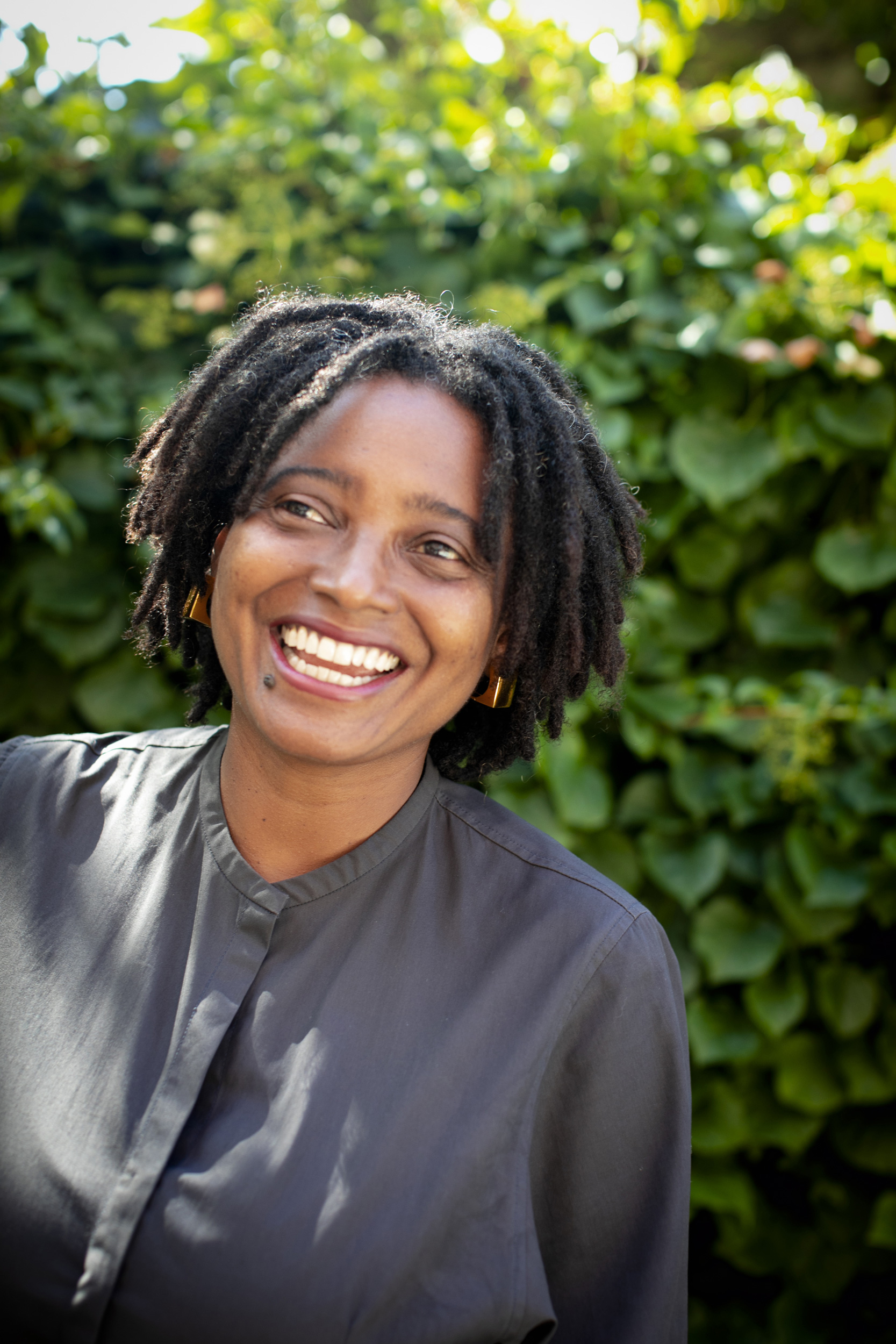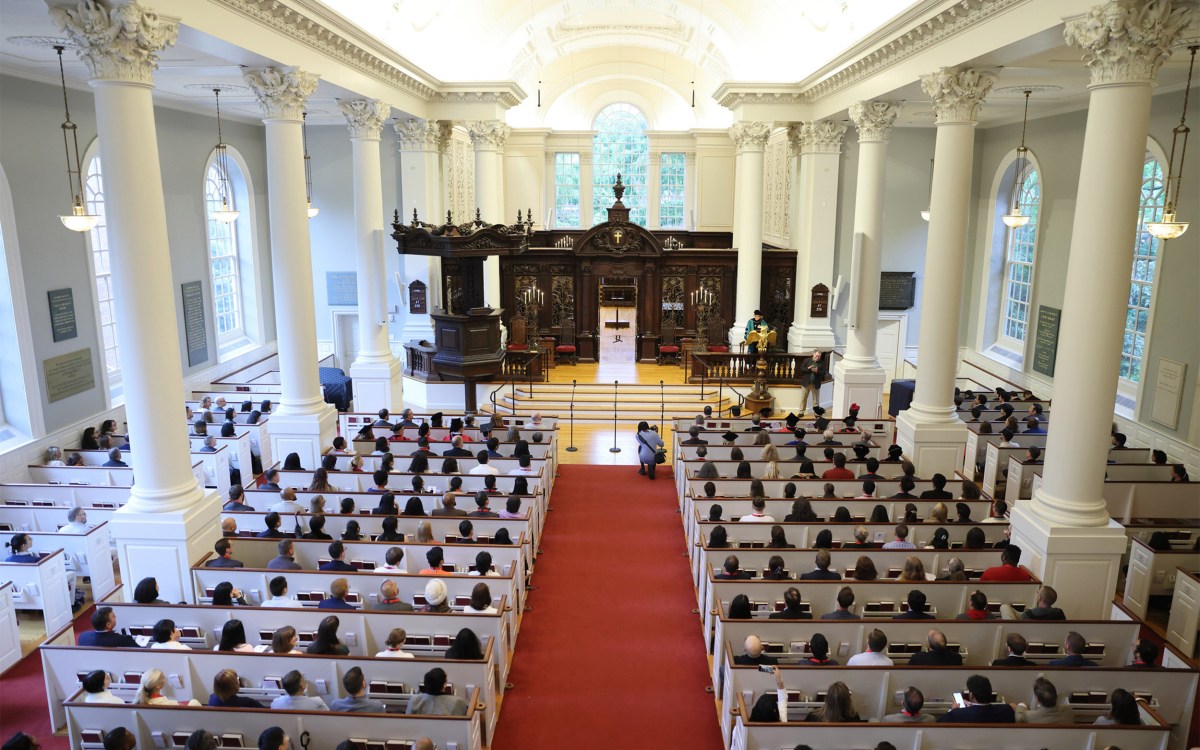Naming the things you feel
Celebrated poet and new faculty member Tracy K. Smith aims to create life-changing space for students

Tracy K. Smith joins the English Department as a professor of English and of African and African American Studies.
Stephanie Mitchell/Harvard Staff Photographer
Tracy K. Smith arrived at Harvard in 1990 as a teenage undergraduate, unsure of her creative path and wary of the onset of adult life. Adjusting to life away from home in California and dealing with her mother’s recent cancer diagnosis, she found solace in her first creative writing workshops with renowned poets, including Lucie Brock-Broido and Seamus Heaney, where she learned how to use her writing to express and comprehend her deepest feelings.
“I remember being 19 or 20, sitting in those classrooms, trying to live a life on this campus as an adult. I felt vulnerable and confused in so many ways,” said Smith, a 1994 graduate of the College who this summer joined the Harvard faculty as a professor of English and of African and African American Studies and the Susan S. and Kenneth L. Wallach Professor at the Harvard Radcliffe Institute.
Smith had been reading and writing poetry since grade school, but “just taking the time to move through a poem and gather a sense of its insights helped me to name the things I was feeling. It saved my life, in a way,” she said.
Those foundational experiences fueled Smith’s nearly 30-year career, during which she received a Pulitzer Prize for Poetry, a National Book Award nomination, and served two terms as the 22nd poet laureate of the United States (2017-19), among many other accolades. She is the author of five books of poetry — “Wade in the Water,” “Life on Mars,” “Duende,” “The Body’s Question,” and the forthcoming “Such Color: New and Selected Poems” — and a memoir, “Ordinary Light.” She directed the creative writing program at Princeton before she joined the faculty at Harvard.
Recalling the joy and challenges of her own early studies, Smith set out to create a similarly life-changing space for a new generation of writers in her fall course, “Poetry Workshop: Form & Content.”
“I love the feeling of trust and investment that takes shape, often quickly, in a workshop. I feel inspired by the risks my students take and illuminated by their reactions to the work of poets I love,” she said, noting the inclusion of poets like Jericho Brown, Su Hwang, and Michael Kleber-Diggs on the fall syllabus. “That moment when we begin to recognize that we have forged a collective vocabulary for talking about poems — it feels like a revelation every time. A workshop also keeps me honest, in a way, because the students are pushing themselves to write poems and take new risks every week, and I often feel compelled to write in solidarity with them.”
In her own work, Smith explores themes of love and desire, justice, loss, and human connections across time, history, and difference. Critics laud her clear language, expansive storytelling, and her engagement with the thorny paradoxes of everyday life and larger questions of American history, justice, and racism.
“I love the moment when I start to sweat a little bit as I’m writing, when the poem that I’m working on urges me to realize that I’m also a of part of the problem — whatever it might be — that my poem is helping me grapple with. I love it when my poems remind me that if I’m invested in making a situation better, I need to let go of some of the things that I’ve long done or some of the strategies that I’ve long resorted to, both as a writer and a person,” she said.
“That’s the space where I think poems make us better people, where they can make us perhaps willing to acknowledge the contradictions that we’re tangled up in all the time.”
UNTITLED #1 (PICKET FENCE AND FARMHOUSE), after the photograph by Dawoud Bey
by Tracy K. Smith
transcript
Transcript:
We stand square in its frame,
revealed and claimed.
On every side: our fathers, sisters,
our very mothers
doing what’s been done
to everyone.
It is a plot,
a garden lot.
Row upon row,
we are what grows
through storm,
past fruit, seed, wind, bird.
Grief, strife: all endures.
The crop of us blown farther
than our known roots
and our knowing better.
Smith faced many of those contradictions head-on as poet laureate, when she embarked on a seven-stop trip called “American Conversations,” wending her way through rural areas of states including Maine and South Dakota. On the tour, she held public readings and discussions with the goal of inviting participation from people who felt disconnected from the form.
“Often, when I meet people for the first time and they find out that I write poetry, their reaction is, ‘Oh, god, poetry is hard. I don’t know anything about it,’” said Smith.
“But if we talk a little bit more, they remember lines from a poem they once read, or they remember that once upon a time they used to like to write.”
During the trip, she said, “I was moved by the things that people allowed themselves to share, even with strangers. I was moved by the fact that we could very quickly find ourselves in profound conversations about loss or love or fear as a result of reading and talking about poems together.”
“American Conversations” was part of Smith’s larger pursuit to provide opportunities for people to discover poetic language that helps to shed light on their own experiences and those of others. Other public endeavors include a two-year stint hosting the American Public Media poetry podcast “The Slowdown” and a partnership with Turtle Point Press to create a “Divining Poets” set of tarot-like cards featuring selected quotes from poet Lucille Clifton, whose work, Smith said, was “invested in the beauty and urgency of Black life.”
“What I love about reading a poem is that you’re being invited into another person’s voice, and that person’s experience may be useful to the understanding of your own experience. A poem feels like a very brief, but in some ways indelible, form of community,” she said. “I like to believe that if we put ourselves in this position often enough as readers, we become more interested in the experiences of the real people that we are living, working, even struggling with.”
Smith’s community-building projects are balanced out by a deep appreciation for the solitary moments spent grappling with a word or an idea on the road to a finished work.
To write poetry, “you have to go to a quiet place, to be alone and listen inwardly. That habit of connecting to the quiet interior space that we all house is becoming a little bit rarer with the input, the obligations, and the distraction that we live with,” she said. “But I think that it’s somehow essential in order to actually contribute usefully to those collective spaces. Listening to something quiet and honoring the strange and the vulnerable within ourselves and others makes us better citizens, friends, parents, and humans.”




